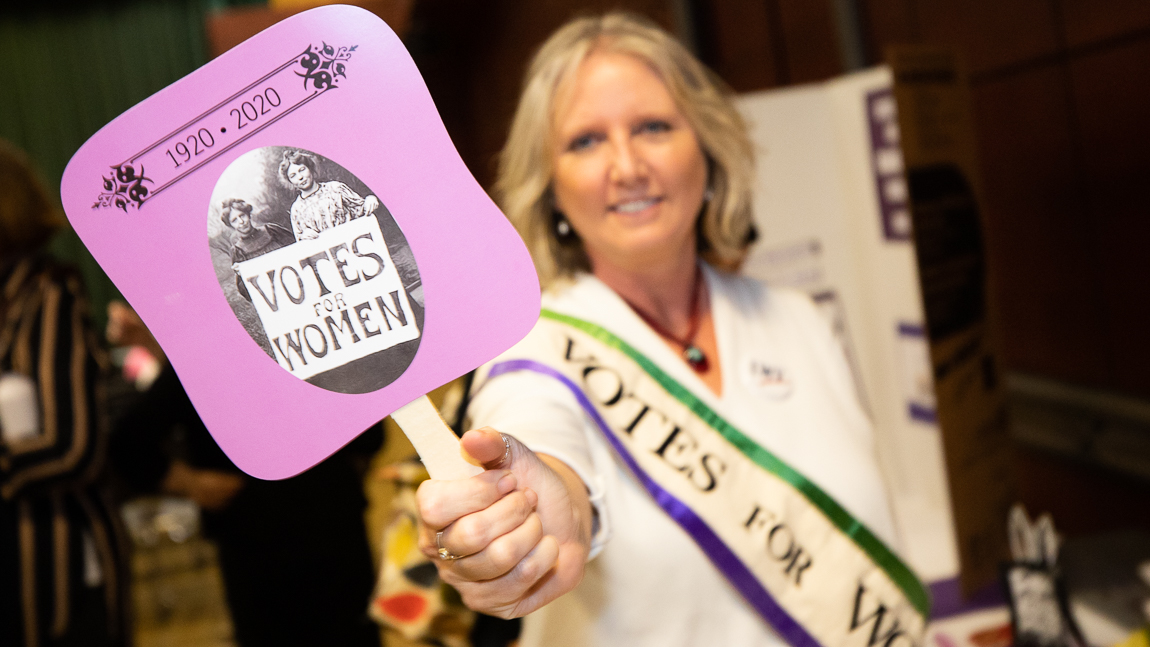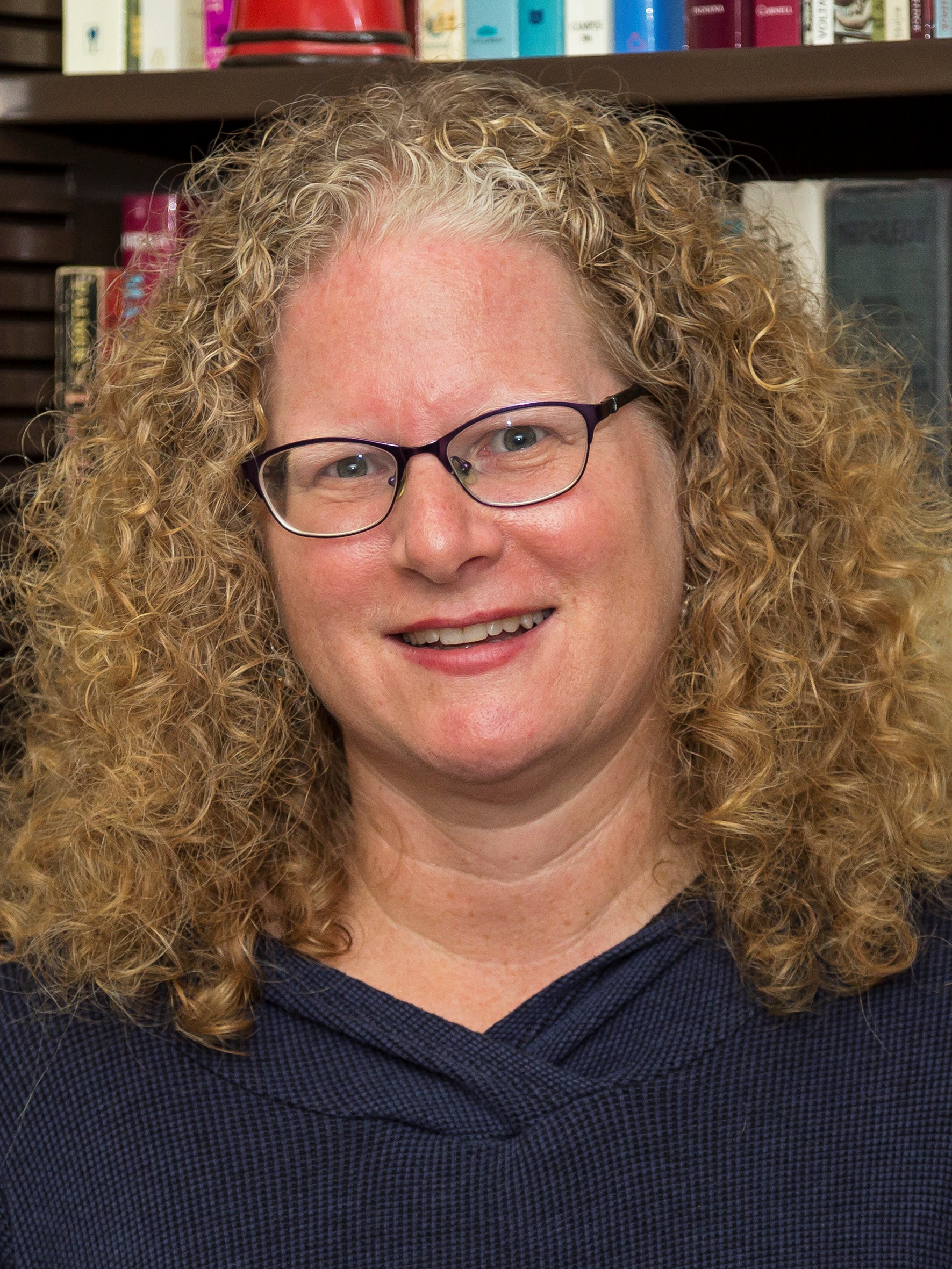
By Cynthia Hubert
Last spring, as the coronavirus swept away society’s plans, Sacramento State was preparing for a yearlong celebration of a transformative milestone in the United States: the 100th anniversary of ratification of the 19th Amendment to the U.S. Constitution.
Concerns about the spread of COVID-19 forced cancellation of carefully planned gatherings, programs, discussions, and other events, which had kicked off in March as a focus of Women’s History Month. The setback did not diminish the importance of the milestone, however.
Though no longer able to do so face to face, Sac State leaders continued to celebrate the importance of the history of women’s quest for equal rights, even as a critical question remains: How far have women advanced since ratification of the amendment on Aug. 8, 1920?
 Cutline goes here. (Sacramento State file)
Cutline goes here. (Sacramento State file)- Timeline: Milestones on the road to women's voting rights
- Voting push continues Sac State's civic engagement efforts
- Elections resources: 'Hornets Vote. Hornets Count.'
Part of the answer is clear. Women have blazed trails and shattered barriers in academia, politics, medicine, law, society at large, and beyond.
At Sacramento State, the leadership roster suggests progress. Many of the University’s top administrators are women, including Diana Tate Vermeire, executive director of Diversity and Inclusion; Chevelle Newsome, dean of Graduate Studies; Jenni Murphy, dean of the College of Continuing Education; Dianne Hyson, dean of the College of Social Sciences and Interdisciplinary Studies; and Lisa Cardoza, vice presdent for University Advancement.
A Sac State panel discussion in March on gender equity included California Treasurer Fiona Ma, Lt. Gov. Eleni Kounalakis, Sacramento Mayor Pro Tem Angelique Ashby, and West Sacramento City Councilwoman Quirina Orozco. Each of the women represent “firsts” in their fields, and all spoke of facing opposition because of their gender.
“Do I think the world would be better off with more women in leadership? Absolutely,” Ashby said.
As the only woman on Sacramento’s City Council, Ashby has gained a reputation for being “very aggressive” when fighting for issues, she said.
“Guess why I’m aggressive,” she said. “Because I have to fight eight guys every week.”
“Civil rights are never just won and then go on forever. Every gain that women make comes with some backlash against social change. But generation after generation, women have refused to back down.”
“I think it would be phenomenal to have more women, more sisters, more allies in arms” in leadership positions, Ashby said. Currently, “we have to work twice as hard, and there are double standards for everything we do and say.”
Ma said that when she was one of two women on the Board of Supervisors in San Francisco in the early 2000s, male members “didn’t take us seriously” and “tried to kill our legislation, take us off committees or anything that would give us any kind of empowerment.”
Ma decided to “stop fighting” her male colleagues and focused on attending neighborhood events, making connections and gathering information important to her constituents.
Although women have made strides, politics remains “very male dominant,” she said, from elected officials to lobbyists and consultants.
Kounalakis said gender parity is a realistic goal, but it will take time and considerable effort from both men and women.
“It’s not something that can happen without ongoing struggle, and ongoing work and commitment by all of us,” she said.
“Men and women working together with mutual respect is better for everyone,” Kounalakis said.
In another forum, three Sac State experts discussed the history of women’s suffrage, a movement officially launched in 1848 with the Seneca Falls Convention and ultimately lasting more than 70 years.
“It lasted beyond most people’s lifetimes” and coincided with other campaigns including those for workers’ rights, prohibition, and abolition of slavery, said Sac State historian Rebecca Kluchin. At the time, American women were widely expected to be submissive wives and mothers, concerned almost exclusively with home and family.
It took a tumultuous seven decades to ratify the 19th Amendment. Today, just as many women turn out to vote in American elections as men.
Women have crashed through barriers to become chief executive officers, university presidents, governors, senators and congresswomen, astronauts and Nobel Prize winners – partial entries on a long and growing list of accomplishments.
But 100 years after their demand for voting rights was realized, women have not achieved equality with men, said Mona Siegel, a Sac State History professor whose book about the history of women’s rights, Peace On Our Terms, was released this year.
“A hundred years ago, the suffragettes believed that the right to vote would open the door to social, political, and economic change, and that everything else would follow,” Siegel said. “In some ways, they would be disappointed by where we are today.”
But signs of progress can be seen everywhere on the Sac State campus, she said. About half of the University’s students are now women, and females outnumber males on some college campuses around the country. That is a level of participation that few could have imagined a century ago, when many people believed women lacked the mental capacity to pursue degrees, Siegel said.
“That’s a foundational change and very important,” Siegel said. Suffragettes of all races “had to fight incredibly hard” to get college educations, she said. “Getting that education is crucial for women to develop the skill sets” to excel in their careers.
Yet obstacles to their success remain.
Internationally, America is “utterly behind the curve” in political leadership, Siegel said. Finland, the Philippines, Indonesia and Ethiopia are among the countries that have female heads of state, she pointed out.
“In the United States this year, we had at least three very highly qualified female candidates running in the (presidential) primary election,” Siegel said. “The fact that none of them was seen as equally qualified as the male contenders is a very real sign that the United States is behind the times.”
Many voters, both men and women, questioned the “electability” of the female candidates or said they were not “likable” enough, stances that Siegel said hint at entrenched sexism.
“It’s code language for ‘I don’t trust a woman in that position,’” Siegel said.
Yet despite recurring obstacles, Siegel is generally optimistic that women will continue to make gains toward full equality.
“Civil rights are never just won and then go on forever,” she said. “Every gain that women make comes with some backlash against social change. But generation after generation, women have refused to back down.”
She believes that the next generation will inherit a world in which women have a more robust voice in politics and overall society, she said.
“There are plenty of cultural and other obstacles that I hope all of us, men and women, will keep challenging,” Siegel said. “But I’m encouraged because I feel that no field will be out of reach in the world that my daughter and my son will inherit.”
Sac State History Professor Mona Siegel spoke about women’s suffrage on Capital Public Radio’s “Insight” program on Aug. 18. That conversation can be heard on the program's podcast beginning at minute 23.